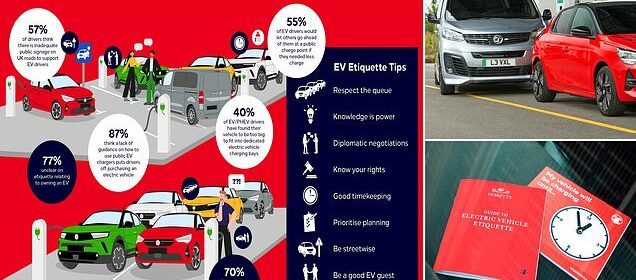Debrett's guide to do's and don'ts of electric vehicle etiquette

What is the polite way to queue for a charging point? Is it ok to unplug other vehicles? And how should you park? Manners experts Debrett’s creates definitive guide to the do’s and don’ts of electric vehicle etiquette
- Study finds 49 per cent of 2,000 cars owners are not clear on EV etiquette
- Vauxhall has vowed to offer fully electric versions of all of their models by 2024
Manners experts Debrett’s have teamed up with British car giants Vauxhall to create the definitive guide to the do’s and don’ts of electric vehicle etiquette.
The EV Etiquette Guide includes tips on the polite way to charge your car when visiting friends, advice on how to queue when waiting for a public charging bay, and whether it’s okay to unplug other vehicles at charge points.
It also features guidance on leaving charge points in a state you’d hope to find them in and advice on allowing enough room for larger vehicles to fit in public charging bays next to you.
Vauxhall, which has promised to offer fully electric versions of all of the models in its vehicle line up by 2024, partnered with Debrett’s to create the guide.
The guide follows a study by the car manufacturer which found 70 per cent of motorists believe there’s a lack of guidance on aspects of EV ownership – including charging.
Manners experts Debrett’s have teamed up with British car giants Vauxhall to create the definitive guide to the do’s and don’ts of electric vehicle etiquette
The EV Etiquette Guide includes tips on the polite way to charge your car when visiting friends, advice on how to queue when waiting for a public charging bay, and whether it’s okay to unplug other vehicles at charge points
Vauxhall has promised to offer fully electric versions of all of the models in its vehicle line up by 2024
It found 49 per cent of the 2,000 car owners polled claimed they’re ‘not clear at all’ on the general dos and don’ts when it comes to electric vehicle etiquette.
Liz Wyse, for Debrett’s, said: ‘As the electric vehicle revolution transforms our roads, our behaviour and etiquette must accommodate these changes. It is clear that many drivers are uncertain about the etiquette relating to owning an EV.
‘The new Electric Vehicle Etiquette Guide aims to address these uncertainties, providing clear guidance on charging and parking protocols, as well as some recommendations about good etiquette that will contribute to a civilised and agreeable EV experience.’
The guide also advises those using a rapid-charge points, to ensure they don’t stay longer than necessary and cause others to miss out.
And those with bigger vehicles should be careful not cross over into the space next to them – and obstruct other drivers needing to use the bays.
Vauxhall’s research also found charging issues are high on the list of reasons petrol or diesel drivers are discouraged from making the switch.
Exactly two thirds (66 per cent) cite fears over how far they can get on a single charge, and 60 per cent have concerns of charging times.
And 63 per cent worry about a lack of charge points, with recent reports suggesting Britain’s network of EV chargers is struggling under the load.
But 37 per cent of all the motorists polled believe the top benefit of driving an EV is the reduced impact on the environment.
While 43 per cent would enjoy the lower running costs, and the same amount would benefit from no emission or congestion zone charges.
Nearly half (46 per cent) of the EV owners polled, as part of the OnePoll research, also found they have been unable to park in a charging bay because a non-electric vehicle was using it.
Vauxhall Managing Director, James Taylor, said: ‘As part of our mission to electrify Britain and to become an electric-only brand from 2028, we are committed to making owning an electric vehicle as easy as possible.
‘With over three quarters of drivers unsure on electric vehicle etiquette, this very British guide is designed to answer any of the day-to-day questions that prospective EV owners might have.’
Source: Read Full Article


